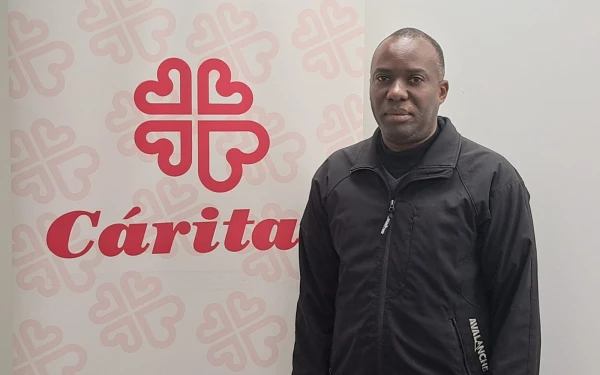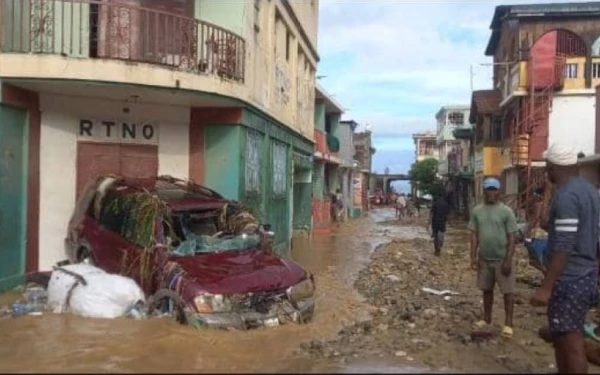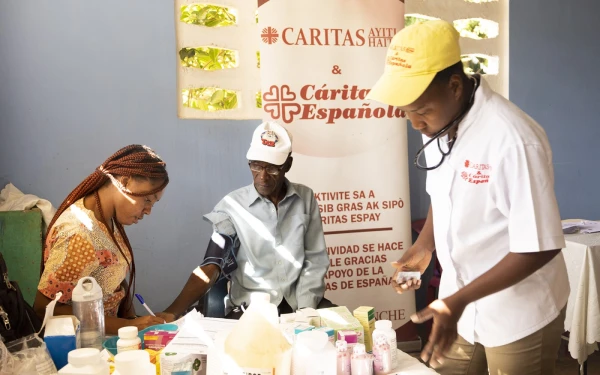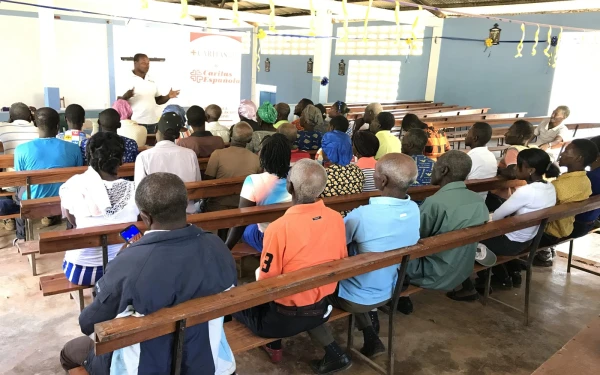The director of Cáritas Haiti, Fr. Yvel Germain, calls on the international community not to forget Haiti, the poorest and most unequal country in the Americas, plagued by violence, hunger and political and social crisis.
Father Germain was born in 1979 in Thiotte, in the southeast of the country, into a Catholic family with three children. The eldest is a farmer, like his father and his sister, a teacher. His mother is a merchant.
Receive the main news from ACI Prensa by WhatsApp and Telegram
It is increasingly difficult to see Catholic news on social media. Subscribe to our free channels today:
As detailed to ACI Prensa, his vocation was born from the desire to celebrate the Eucharist, as he had seen so many times. After his high school studies in Port-au-Prince, he entered the seminary.
Graduated in Philosophy and Theology from the Catholic University of Haiti, he specialized in local development at the University of Lyon (France).

Since 2024 he has directed Caritas Haitia network present in each of the 10 dioceses of the country in a capillary way. “The Diocese of Jacmel has 33 parishes and each of them, several chapels. My original one is ten,” he exemplifies.
This allows, unlike other organizations, the care provided by Cáritas to be much more capillary, not only in terms of the population served throughout the territory of the western area of the island of Hispaniola, but above all in substance.
“Cáritas does not make discrimination or distinction and does not stop only at women’s rights, for example, but rather serves human beings with a comprehensive vision,” he details in conversation with ACI Prensa.
In the opinion of Father Germain, the difficult situation of the country is not exclusively related to some natural catastrophes suffered in the past such as the 2010 earthquake, Hurricane Matthew in 2016 or the seismic movement of 2021.

“Natural disasters can happen at any time, but the country has been experiencing a sociopolitical crisis for years. During the government of Michel Martelly (2011-2016) funds were received from international organizations to rebuild the country, but the opposite was done,” he explains.
In a meeting organized by Cáritas Española, which has been supporting its sister organization in the Caribbean country for almost three decades, Father Germain explained that the last democratic elections took place in 2016 and that after the assassination of President Jovenel Moïse in 2021 No elections have been called again.
This power vacuum has been occupied by armed gangs “who control a large part of the territory,” especially the capital, Port-au-Prince. In this context “Cáritas remains at the side of poor people who suffer.”

“There is a great violation of human rights, of girls, women, and also adults, and the Church understands that in this context it is important to provide support for all these people,” said Father Germain.
It is estimated that more than five and a half million Haitians suffer from acute food insecurity, according to the United Nations, to which we must add that more than one million people are displaced from their homes to areas of the south and southeast due to violence.
There are also many who have left the country. Father Germaine has admitted to the media that he has an aunt whom he does not know, who emigrated to the Dominican Republic years ago.
“The situation is serious and there is a great need for help,” insisted the priest, who confirmed that there are already troops under the UN mandate in the country.
This circumstance is not necessarily good news for the director of Cáritas Haiti: “In 1996, the presence of MINUSTAH (United Nations Stabilization Mission in Haiti) was one of the reasons why many people accessed weapons” , he stated.
However, not everything is negative, despite the fact that “the country is in a situation of oblivion” and in some aspects “there is an apparent improvement.” For example, in certain neighborhoods of Port-au-Prince “shooting has been reduced.”
However, internal displacement is threatened by the different armed groups, to the point that when Cáritas distributes food “it does so by boat, because it cannot pass through controlled areas.” Only some drivers reach agreements with the gangs.

Proof of the difficulties in getting around is Father Germaine’s own journey to leave the country: he had to cross conflictive areas, use a car, then a motorcycle, and complete the journey to the border with the Dominican Republic with an hour and a half walk. .
Furthermore, the situation of the little ones is especially worrying: “No one talks about the children who sleep on the street, without anything to eat, without shelter.” Given this situation, he demands that the international community “be more aware, review the situation in the country” and act in connection with grassroots organizations that know this reality.
Cáritas Española, in collaboration with Cáritas Haiti, has supported humanitarian action programs in recent years that have alleviated the harsh living conditions of more than 10,000 people with an investment of 2.4 million euros.
In support of the emergency campaign promoted by Cáritas Internationalis, the Spanish organization has sent a first aid of 100,000 euros intended especially for displaced people in Hinche and Fort Liberté.

